Policy publications
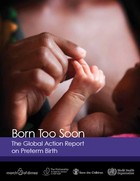
The first-ever national, regional and global estimates of preterm birth
Born Too Soon: The Global Action Report on Preterm Birth was released on 2 May 2012. It provides the first-ever national, regional and global estimates of preterm birth. The report shows the extent to which preterm birth is on the rise in most countries, and is now the second leading cause of death globally for children under five, after pneumonia.
Addressing preterm birth is now an urgent priority for reaching Millennium Development Goal 4, which calls for the reduction of child deaths by two-thirds by 2015. This report shows that rapid change is possible and identifies priority actions for everyone. Born Too Soon proposes actions for policy, programs and research by all partners – from governments to NGOs to the business community — that if acted upon, will substantially reduce the toll of preterm birth, especially in high-burden countries.
This inspiring report is a joint effort of almost 50 international, regional and national organizations, led by the World Health Organization (WHO) and the child-health advocacy groups Save the Children, The Partnership for Maternal, Newborn & Child Health, and March of Dimes. As one of the supporting organisations, EFCNI is proud of having contributed to the realisation of this important publication. The report contains a foreword by UN Secretary-General Ban Ki-moon and is accompanied by more than 30 new and expanded commitments to prevention and care of preterm birth, joining more than 200 existing commitments on www.everywomaneverychild.org.
Please download here the report Born too Soon in English
Please download here the Executive Summary of Born too Soon in English
Please download the country ranking (per April 2012)
Or visit
http://www.who.int/pmnch/media/news/2012/preterm_birth_report/en/index.html
for a complete overview on information, report and tools available in English, Spanish and French.

The 10 points Call to Action for Newborn Health was initiated by EFCNI and the European national parents’ organisations.
On 23 November 2011, it was launched in the European Parliament in collaboration with the European Parliament’s Interest Group on Maternal and Neonatal Health, alongside the EFCNI White Paper Caring for Tomorrow.
Today, there are no recognised European standards. The level of care a baby and the family experiences often falls far short of promoting and protecting the right to a healthy start in life. Targeted health and social policies on newborn health are needed as a matter of urgency.
Download of the Call to Action for Newborn Health
For a Healthy Start in Life
EFCNI and the European national parents’ organisations therefore call on EU and national policy makers, payers, patient and parents’ organisations, healthcare professionals, academics, industry and the public to unite and work in partnership to ensure that each baby born in the EU has the best possible start in life. In order to meet these goals, policy makers should:
- Recognise maternal and newborn care as a top public health priority and integrate both into European and national strategies on public health, chronic conditions, healthy ageing and research.
- Establish and implement targeted national strategies for minimising pregnancy risks on the basis of best practice and with the advice of interdisciplinary taskforces.
- Guarantee that all newborns have equal access to high quality care; that high risk newborns in particular receive appropriate specialised services and aftercare programmes. This requires early diagnosis, improved standards of care with documented medical follow up and optimal healthcare services specifically aimed at preterm and high risk newborns tackling chronic diseases.
- Ensure appropriate and continuous education and training for all healthcare professionalsworking in pre-conception, maternity, newborn care and aftercare fields. The quality of training should be raised and, where appropriate, harmonised across Member States so as to promote equal standards of care for all newborns.
- Encourage the uptake of a family-centred approach and developmental care by neonatal hospital units to help alleviate newborn and parental stress and anxiety and to promote parenting roles both in the hospital and after discharge.
- Provide for equal and easy access to full information, counselling, education and, if necessary, training of (expecting) parents on pre-conception and maternal issues, preterm and newborn care, early parenthood and aftercare.
- Promote the right of parents to have access to adequate psychological and social care and support systems in order to provide a stable environment for the birth and care of newborns into their childhood.
- Launch wide scale public health awareness campaigns around healthy pregnancy, the growing incidence of prematurity and the associated risks.
- Establish harmonised and comparable European data sets for maternal health outcomes and preterm birth , the collection of which should be founded on the basis of common definitions and measurement criteria to allow for comprehensive study and comparative analysis and to monitor and improve health outcomes.
- Provide funding for research on maternal and newborn health and aftercare which aims to prevent preterm birth and reduce the number of chronic illnesses suffered by babies born prematurely.
The Call to Action for Newborn Health is supported by an educational grant from Abbott.
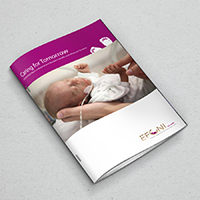
EFCNI White Paper on Maternal and Newborn Health and Aftercare Services
In 2010, EFCNI published an EU Benchmarking Report to help capture for policy makers the impact of prematurity across Europe. The EFCNI Benchmarking Report ‘Too Little, Too Late’ painted a compelling picture of the differences that exist in levels of care when it comes to maternal and newborn health in Europe. Indeed, it showed that in most EU Member States, maternal and newborn health is not considered to be a public health priority, despite its obvious connection to health outcomes in adult life.
It also began a reflection process amongst parents, medical professionals, academics and industry partners to move from an identification of the various provisions that EU Member States have made for newborn infants, to concrete proposals for improving the standards of care in Europe.
As such, Caring for Tomorrow, the EFCNI White Paper on Maternal and Newborn Health and Aftercare Services aims to highlight some of the key concerns with regard to this growing patient group.
Parents who gave birth to a preterm baby or persons who shared the time before and after a preterm birth with the concerned family know quite well the feeling of helplessness: Even if most European countries provide high-quality neonatal care, the special needs of preterm infants are often neglected.
Furthermore, there is a lack of comprehensive public information and education on this topic: Still today many pregnant women are not aware of potential risk factors and how to prevent preterm birth. Concerned parents need better guidance how to care for their preterm baby during their stay in the hospital and after discharge as well as how to obtain support.
Well-organised, effective and targeted pre-conceptional, maternal and newborn care can make a lifelong difference to preterm born babies and newborns with illnesses as well as their families. Support to get this care right is the aim of EFCNI and the European national parents’ organisations.
Aim and use of the EFCNI-White Paper
This EFCNI White Paper is designed to initiate and support discussions in the European Union and its Member States on the delivery of high-quality safe health care starting at pre-conception and reaching to aftercare. Only by adding maternal and newborn health back on the political agendas, urgent health problems of our (future) societies can be tackled and ideally be prevented. This Paper intends to underpin the importance and responsibility for societies to ensure that mothers, parents, preterm infants and infants with illnesses receive the appropriate attention and good care necessary to produce the best long-term outcomes for them and for their families.
European and national policy makers should use this Paper to plan, improve and deliver quality care for mothers and their newborns, and especially preterm infants and newborns with illnesses and their families.
Health care providers from different medical disciplines and professions as well as parents and professional societies were asked to provide their perspectives on challenges and evidence-based recommendations in the field of pre-conceptional, maternal, newborn care and aftercare.
As a result of these contributions, a set of key recommendations for quality pre-conceptional , maternal, newborn care and aftercare were developed in each field.
Thirteen key recommendations
The thirteen key recommendations identified in this White Paper cover the following areas of activity on national and European level:
- Recognize the issues of maternal, newborn care and aftercare as a public helath priority, particularly the health of preterm infants and infants with illnesses
- Acknowledge the potential long-term consequences of preterm birth and for newborns with illnesses that need to be tackled
- Address health inequalities in maternal and newborn care within all European Member States
- Conduct national audits on maternal, newborn care and aftercare services and establish a multidisciplinary task force for developing national best practice guidelines
- Implement national policies and guidelines for high-quality pre-conceptional, maternal and newborn care and aftercare. These policies and guidelines should include the principles highlighted in this White Paper
- Provide equal and early access to full and true information, education and counselling
- Harmonise education and training of health care providers
- Provide social and financial support to parents and families
- Develop and implement strategies for public awareness and education
- Harmonise cross-border maternal and newborn healthcare
- Monitor outcomes and implement audit procedures in maternal, newborn and aftercare
- Implement European wide standardised datasets for pregnancy and preterm birth outcome
- Invest in comprehensive research to tackle the challenge of preterm birth and its potential long-term consequences
Parents’ and newborns’ rights
In addition to these recommendations and principles for pre-conceptional, maternal, newborn care as well as aftercare, EFCNI summarized clear rights of parents and newborns which need to be taken into account in any health care strategy on maternal and newborn care.
Within the heterogeneity of European health care standards and economic conditions, politicians, stakeholders, health care providers, parent representatives and strategic health authorities will need to work together to identify key parts for implementation of these recommendations on a national and European level and discuss the potential financial impact of the recommendations required to provide cash-releasing savings and improve productivity in order to make improved, high-quality maternal, neonatal and aftercare services a reality in all Member States.
Launch Event White Paper Nov 2011
Please click on the video below for an impression of the launch event in November 2011.
This report was produced by EFCNI, supported by Weber Shandwick, Brussels, an EU public affairs and public policy consultancy, in collaboration with the editoral board of this White Paper.
The whole project was supported by an unrestricted educational grant from Abbott, partially co-sponsered by Dräger as well as Nestlé Nutrition, Chiesi and Getemed.
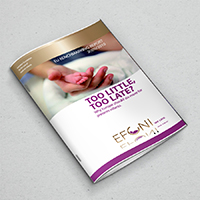
European benchmarking report
A child’s risk of dying is highest in the first month of life – a time when safe childbirth and effective neonatal care are essential to their survival. Four million neonatal deaths occur every year around the world – that is 450 every hour. Prematurity – a baby born before 37 weeks of gestation – is the single, major cause associated with infant mortality and morbidity in both developed and developing countries. In Europe, the prevalence rate of premature birth ranges from 5.5 to 11.4% – an average of 7.1% of all live births.
The EU Benchmarking Report, presented for the first time in the European Parliament on 6th May 2010 in Brussels, and updated in November 2011 with the inclusion of Ireland into the comparison, provides a compelling picture of the impact on prematurity across 14 European countries. It reveals a troubling lack of coordinated national and European policy initiatives to improve the quality of treatment and care of preterm infants. Such care would help to reduce both the number of preterm babies and to prevent long-term complications. In publishing this report, EFCNI has one clear objective: to give a voice to one of Europe’s most vulnerable, yet overlooked patient groups – preterm infants.
Download here the report “Too little, too late? Why Europe should do more for preterm infants”.
Download here the Irish Benchmarking report.
Download here the German translation of selected parts of the report.
Download here the Italian translation of selected parts of the report.
Methodology – structure and scope
Based on desk research and interviews with healthcare authorities, doctors, nurses and parent associations, the report provides statistics, policies and trends in 14 European countries chosen as a representative cross-section of EU member states. These include the following countries:
Austria, Belgium, Czech Republic, Denmark, France, Germany, Italy, Ireland, Netherlands, Poland, Portugal, Spain, Sweden and United Kingdom.
For each country, the report aims to assess the following areas of relevance to prematurity:
i) Prevalence and cost
ii) Government health policy agenda (general)
iii) Neonatal health policy
iv) Prevention and screening
v) Medical treatment and care, after-care and long-term care
vi) Social and financial support
vii) Outlook and planned activities
Editorial Board
An editorial board of ten neonatology and gynaecology experts oversaw the quality of the report’s content and endorsed the EFCNI policy recommendations.
Matthias Keller
EFCNI Foundation Board, Department of Pediatrics, University Essen
Hugo Lagercrantz
Karolinska Institutet, Astrid Lindgren Children´s Hospital, Stockholm, Sweden
Mario Merialdi
Department of Reproductive Health and Research, World Health Organisation, Geneva, Switzerland
Ola D Saugstad
Department of Pediatric Research, Oslo University Hospital, Rikshospitalet, University of Oslo, Norway
The board was led by Dr. Matthias Keller and Prof. Dr. Hugo Lagercrantz and supported by Prof. Dr. Ursula Felderhoff-Mueser, Prof. Dr. Olaf Dammann, Prof. Dr. Neil Marlow, Prof. Dr. Petra Hüppi, Prof. Dr. Giuseppe Buonocore, Prof. Dr. Christian Poets, Prof. Dr. Georg Simbruner, Prof. Dr. Hercilia Guimaraes and Silke Mader
Key findings
There is currently no single source of up-to-date, comparable European data on the prevalence, mortality and morbidity associated with preterm births.
Official national sources of information about preterm birth do not appear to be available to decision-makers in a number of countries to support the development of neonatal policies
Data on preterm birth, including risk factors, management and outcomes of neonatal healthcare is not collected and analysed consistently across EU member states – reliable statistics are scarce and, where they do exist, are often inconsistent
Even in the absence of rigorous data collection, available data suggest a clear trend of increasing prevalence of preterm births in all of the EU countries (with the exception of Sweden).
Existing data also highlight considerable inequalities in the preterm birth rates in European countries, with wide variations both between and within countries.
Data collection systems are often voluntary resulting in significant variation in the level of detail, the indicators used (e.g. different weekly categories v. weight), the definition of the indicators themselves and the definition of prematurity.
With regard to costs, there is an absence of reliable and comprehensive cost data in countries demonstrating the health-economic impact of prematurity (with the exception of Denmark).
European data
Prevalence of preterm birth varies across the 14 countries covered by the report from 5.5 % in Ireland to 11.4% in Austria representing an average 7.1% for the region. It also shows that the number of preterm births is rising. For example, in Portugal prematurity increased by 32% over the period 2004 to 2008 (from 6.8% in 2004 to 9.0% in 2008); Austria saw a similar rise from 8.1% in 1991 to 11.1% in 2008 and Spain registered an increase in the number of preterm infants from 17,000 in 1997 to 40,281 cases in 2007. In the UK the number of extremely preterm births rose by 30% between 1995 and 2006.
A decreasing mortality rate among preterm infants is observed in most European countries.
Prevalence and cost
The statistical data collected from the 13 European countries demonstrate the significant and growing prevalence and cost of prematurity in Europe. While much of the data is not easily comparable, due to the different reporting mechanisms and methodologies, there is still a clear indication of the size and growth of this extremely vulnerable patient group as well as the short and long term financial burden it represents to European economies.
According to the 2008 European Perinatal Health Report, which is based on data from 2004, as well as statistics collected from national sources, the following observations can be made:
According to data from 2004, preterm birth rates in the 14 European countries range from 5.5% (Ireland) to 11.4% (Austria). At least 8 of the 14 European countries have preterm birth rates of 7% and above. The lowest preterm birth rates can be observed in countries such as Ireland, Sweden, France and Portugal, although these still account for over 5% of live births. In the last five years, there has been a considerable increase in preterm births – for example, in Portugal, the rate has risen from 6.8% in 2004 to 9.0% in 2008 – an increase of 32%. Very preterm births (births before 32 weeks of gestational age) are estimated to account for approximately 1% of all live births.
A decreasing mortality rate among preterm infants is observed in most European countries. Some countries have begun to improve data collection to assess the health risks and implications of prematurity in the short and longer term (e.g. Czech Republic, Netherlands, Sweden, UK). A few countries have also put in place structured programmes to evaluate the quality of neonatal healthcare services (e.g. Sweden, UK). Underneath is an overview of key findings prevalence and costs:
- There is currently no single source of up-to-date, comparable European data on the prevalence, mortality and morbidity associated with premature births.
- Official national sources of prematurity data do not appear to be available to decision-makers in a number of countries to support the development of neonatal policies.
- Data on prematurity including risk factors, management and outcomes of neonatal healthcare is not collected and analysed consistently across EU member states – reliable statistics are scarce and, where they do exist, are often inconsistent.
- Even in the absence of rigorous data collection, available data suggest a clear trend of increasing prevalence of premature births in all of the EU countries (with the exception of Sweden).
- Existing data also highlight considerable inequalities in the preterm birth rates in European countries, with wide variations both between and within countries.
- Data collection systems are often voluntary resulting in significant variation in the level of detail, the indicators used (e.g. different weekly categories v. weight), the definition of the indicators themselves and the definition of prematurity.
With regard to costs, there is an absence of reliable and comprehensive cost data in countries demonstrating the health-economic impact of prematurity (with the exception of Denmark).
Policies on prematurity
While the available data suggest a considerable and growing number of preterm births across the European region, there is, nevertheless, a notable absence of targeted national policies aimed at reducing the prevalence and improving the health outcomes associated with prematurity. There are currently only two countries in Europe with a targeted national policy for neonatal health and premature infants (Portugal and UK). Several countries have general national plans for maternal and infant health, although they contain no specific provisions for premature infants (, e.g. Spain). A number of countries have no dedicated maternal, infant or neonatal health program in place (Austria, Germany, Sweden).
Neonatal and premature infant health currently ranks low on the political agendas of EU member states – very few countries have targeted policies focused on premature infants. Instead, there is a relatively fragmented approach to policies on premature birth. In this respect, preterm birth remains a secondary priority for action. In some countries e.g. UK, Spain, Czech Republic, current economic pressures are considered to be a key factor influencing the future development and effective implementation of neonatal health policies. In some cases, the reluctance of policy makers to make premature infant health a priority can be partly attributed to a fear of costly interventions and the diversion of funds from other maternal and perinatal health problems.
Prevention and screening
With regard to the prevention of prematurity, our research also revealed an absence of national policies and programs targeted at pregnant mothers at risk of premature birth. Prevention programs targeted specifically at premature birth are generally voluntary and are not consistently organized in each country. Programs are often dependent on hospital guidelines or on the individual practice of healthcare professionals. Education and awareness campaigns are implemented in some countries by parent associations and public authorities. However their scope and impact remain rather limited. There is a general lack of information to parents about the risk factors, warning symptoms and/or recommended lifestyles to prevent premature births.
Medical treatment and care
Care for premature infants is frequently organised at different levels without a common definition of the expertise and particular healthcare interventions that should exist at every level. A number of initiatives have been implemented in several countries to promote the specialisation of the care provided by neonatal units, while this is also considered to pose a challenge in ensuring equal access to specialised care and safe transfers when needed. Quality control and management programs to ensure high standards of quality in neonatal services remain very limited. When data exist, comparability remains very difficult The need for specialised training of doctors and nurses and for increased multidisciplinary staffing for neonatal units, including psychologists and social workers to provide support to parents, is highlighted as an urgent need by parents and professionals in a number of countries including Germany, Spain, France and the UK. More consistent guidelines, specialised training for professionals and financial resources to ensure effective and wide follow up are demanded by both parents and professionals in all EU member states.
Follow-up is not organised in a structured manner for all premature children. Some countries have organised follow up checks for very premature infants, while structured follow up for other premature infants appears to be infrequent and, in most cases, inexistent.
Parental involvement and education
Family-centred care is widely recognised a key objective in all countries. However, insufficient resources mean that widespread implementation is limited as it requires investment in capacity and staff training. Policies towards parents and family in NICUs have improved over recent years, although there still appears to be a number of barriers, particularly in some southern European countries.
Financial & Social Support
Overall, social policies aimed at protecting premature infants and their families are also lacking in the majority of EU member states. In general, there is no specific social and/or financial support provided to families with a premature infant, unless the child has been recognised as having a specific disability (with Spain being an exception to some extent). Awareness about the existing support schemes is proven to be very poor amongst the general population. Very few countries have put in place services aimed at providing guidance and orientation to parents. The level of access to support services is often associated to the education level and the socio-economic context of the family. Selected countries offer an extended period of maternity and/or parental leave to the families of premature infants; however the majority offer no additional benefits on top of the standard period of leave.
Outlook and planned activities
Very few countries are reported to be planning new policy initiatives in the area of premature infant and neonatal health in the coming months. Neonatal stakeholders view the situation quite negatively and are not optimistic about the prospect of significant changes in the near future.
Summary and conclusion
Based on findings of the report important issues to be considered for policies at EU and national levels can be deduced. The European Union should:
- Recognise the growing challenge of prematurity in Europe and its significant impact on infant morbidity and mortality and acknowledge the health and social inequalities linked to prematurity which exist across the EU’s member states. Premature infant health is currently absent in the development of EU health and social policies – a surprising observation given the significant and rising prevalence of preterm births and related health complications in Europe.
- Demonstrate the EU’s commitment to improving neonatal health through the development and implementation of coordinated EU health and social policies. The EU has an essential role to play in raising neonatal health standards across Europe. While respecting member state responsibility for healthcare delivery, the EU should contribute through the development of targeted health and social policies, by providing a forum for the sharing of best practice among countries and supporting the development and implementation of national neonatal policies.
- Address the lack of comparable European data on prematurity, including prevalence, mortality, acute morbidity, long-term impairment, healthcare service management and health outcomes and support the creation and strengthening of data collection systems with common measurement criteria. Reliable epidemiology and quality outcomes data, are necessary to develop meaningful, evidence-based health policies at EU level and to support complementary efforts at the national level. While there have been attempts to create independent European networks with the aim of improving data collection, such initiatives remain limited and require improved coordination as well as more sustainable, long-term funding and a broader scope in order to make a real impact.
- Increase the standard of neonatal care across Europe by supporting the development and implementation of a European medical guideline and quality standard for the prevention, treatment and long-term care of premature infants. As evidenced by the results of our research documented in this report, the policies and practices in place for the prevention, treatment and long-term care of premature infants vary considerably across Europe, with a considerable impact on the quality of care, health and social outcomes.
- Prioritise and allocate EU funding to promote coordinated European neonatal and perinatal research to improve the prevention, treatment, care and outcomes of preterm births and support the establishment of European research centers and networks. In longer-term, the 8th Framework Program should include perinatology and neonatology as a key priority area for future EU-funded health research.
- Support the development of a European postgraduate training program in Peri- and Neonatology in order to increase the quality and availability of trained healthcare professionals. In the majority of EU member states, there is a shortage of trained neonatal healthcare and research professionals (specialised nurses and doctors, as well as scientists) to meet the specific needs of a growing number of preterm births.
The high global neonatal mortality represents one of the most burning human right issues in our time. Also in Europe neonatal mortality can be further reduced. We know how to do it. The present report may contribute in this effort by reducing prematurity one of the major factors contributing to neonatal death.
The high global neonatal mortality represents one of the most burning human right issues in our time. Also in Europe neonatal mortality can be further reduced. We know how to do it. The present report may contribute in this effort by reducing prematurity one of the major factors contributing to neonatal death.
The EU Benchmarking Report 2009/2010 is supported by an educational grant from Abbott.
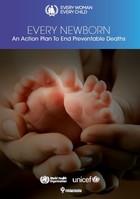
Global Movement: Every Newborn Action Plan
Addressing newborn survival requires clear consensus on evidence, strategies and actions by a broad community of partners. Every Newborn is a roadmap for change taking forward the United Nations Secretary General’s Global Strategy for Women’s and Children’s Health by focusing specific attention on newborn health and identifying actions for improving their survival, health and development.
The plan is being developed by a diverse group of stakeholders, led by WHO and UNICEF, and guided by the advice of countries and experts. EFCNI is a proud member of the advisory group.
A Toolkit provides practical support to all those engaged in promoting greater action and accountability on newborn and maternal health through national planning and programming, advocacy, research, implementation, and monitoring and evaluation.
Link to Every Newborn Action Plan
Link to the Every Newborn Toolkit, which is available in English and French.
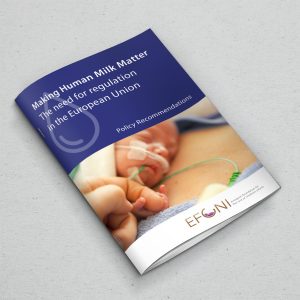
Human milk banks are established institutions that collect, screen, store, process, and distribute donor human milk. In Europe, about 250 human milk banks are currently operating in more than 20 countries. However, donor human milk and human milk banks are not regulated at the level of the EU.
A common regulatory framework would ensure that donor human milk’s procurement, storage, processing, and distribution meet high quality and safety standards. This would furthermore ensure equitable access to safe donor human milk for preterm, sick and low birth weight infants and would contribute towards better health outcomes. Human milk in infant nutrition must be considered a European public health issue and a human right for all these vulnerable infants.
Download the policy recommendations on the regulation of human milk
For more information on the Regulation of Human Milk please visit our project page at www.efcni.org/human-milk-regulation/


